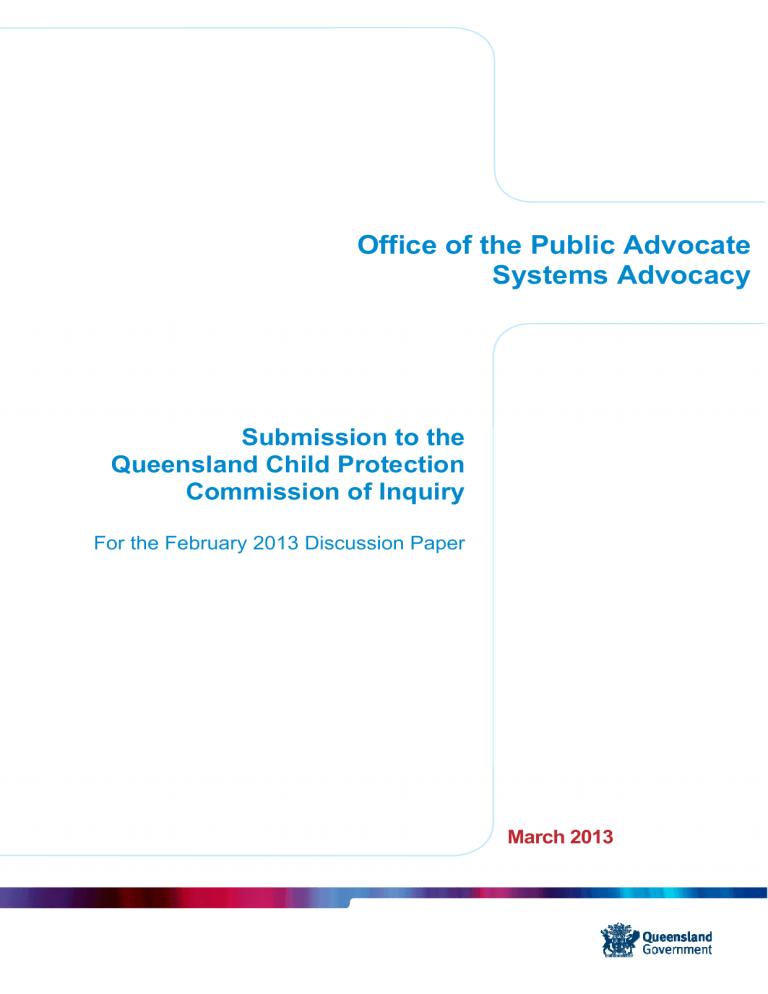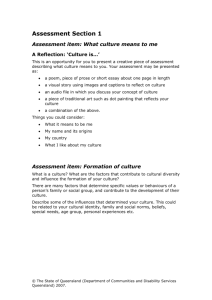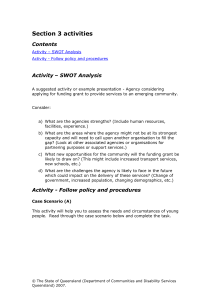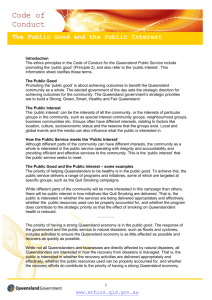Office of the Public Advocate Systems Advocacy

Office of the Public Advocate
Systems Advocacy
Submission to the
Queensland Child Protection
Commission of Inquiry
For the February 2013 Discussion Paper
March 2013
Office of the Public Advocate (Queensland) | Inquiry into the National Disability Insurance Scheme Bill 2012 1 of 7
Interest of the Public Advocate
The Public Advocate was established by the Guardianship and Administration Act 2000 to undertake systems advocacy on behalf of adults with impaired decision ‐ making capacity in Queensland.
The primary role of the Public Advocate is to promote and protect the rights, autonomy and participation of Queensland adults with impaired decision ‐ making capacity (the adults) in all aspects of community life.
More specifically, the functions of the Public Advocate are:
Promoting and protecting the rights of the adults with impaired capacity;
Promoting the protection of the adults from neglect, exploitation or abuse;
Encouraging the development of programs to help the adults reach their greatest practicable degree of autonomy;
Promoting the provision of services and facilities for the adults; and
Monitoring and reviewing the delivery of services and facilities to the adults.
1
In 2013, there are approximately 114,000 Queensland adults with impaired decision ‐ making capacity.
2
3
This vulnerable cohort includes people with a disability or mental health issues and young adults who have been previously subject to a child protection order or child guardianship.
Queensland adults with impaired decision ‐ making capacity are among the most disadvantaged people in the community.
An unacceptably high level of disadvantage is experienced across a range of social and economic indicators.
This disadvantage significantly reduces quality of life and opportunities for social and economic participation.
It also increases the risk of social exclusion, abuse, neglect and exploitation.
There are choices to be made about where to put effort and emphasis to address disadvantage and exclusion, given competing priorities and scarce resources.
Investment in preventative models should be a high priority and advanced given that early system responses are more effective and enduring than crisis intervention.
They can achieve improved life outcomes and reduce the risk of entry into expensive and resource intensive systems.
More broadly, there is an immediate need for all levels of government, across all sectors, to invest in an integrated and sustainable social system that ensures access to social, economic, civic and specialist resources for people with impaired decision ‐ making capacity, their families and support networks.
This is a primary way to promote inclusion, protect rights and interests, and reduce risks of abuse, neglect and exploitation.
Position of the Public Advocate
I commend the Queensland Child Protection Commission of Inquiry for its work in reviewing the effectiveness of
Queensland’s child protection system and mapping its future direction.
I wholeheartedly support any reforms that promote and pursue the best possible protection for children and young people, and enable increased support for families.
Adults are the focal point of the systems advocacy for which I have responsibility, however many of the principles, strategies and policies that I support can be extended to children and young people.
Delivering the best possible supports to children and young people, and their families through effective systems may mitigate the trajectory of some young people into an adult life of chronic disadvantage and minimise contact with the guardianship, criminal justice, mental health, disability and other systems.
The position I have detailed in this submission draws attention to some of the systems issues evident in the
Queensland Child Protection Commission of Inquiry Discussion Paper (the Discussion Paper).
Reducing Demand on the Tertiary System
I unreservedly agree that the most appropriate way to deal with child abuse and neglect is through prevention.
I also acknowledge the challenges associated with balancing preventative interventions and reactive tertiary child protection services, particularly given the vulnerability of children and young people, and the responsibility to protect them from harm.
1
Section 209, Guardianship and Administration Act 2000 (Qld).
2
Australian Bureau of Statistics 2012, Microdata: Disability, Ageing and Carers, Australia 2009 , Cat No.
4430.0.30.002, Australian Bureau of Statistics, Canberra.
3
Australian Bureau of Statistics 2008, Population Projections, Australia, 2006 to 2101 , Cat no.
3222.0, Australian Bureau of Statistics, Canberra.
Office of the Public Advocate | Queensland Child Protection Commission of Inquiry Discussion Paper 1 of 6
The Discussion Paper highlights the need for increased focus on, and funding of, secondary services.
Additional financial resources, coupled with an expansion of early intervention and prevention services and an increase in the number of locations in which they are available, should partially alleviate the escalation of demand for tertiary child protection services.
Most importantly, these enhancements should also contribute to improved outcomes for children and young people, and their families.
Unfortunately, the issue of individuals and families experiencing difficulties navigating and accessing services is not unique to the child protection system.
It is commonly experienced by Queenslanders interacting with other human service systems and is clearly an issue requiring the government’s attention.
The provision of effective services is inconsequential if they are not accessible by the people they are designed to support.
Improved access to services, through increased geographical availability and lower threshold criteria, is critical to ensuring effective early intervention and prevention responses.
In accordance with this, I support the lowering of referral thresholds for early intervention services.
Interventions cannot be defined as ‘early’ if the needs of families are already too complex for the intervention to be effective.
The Discussion Paper recognises that ‘no single service or agency is in a position to respond effectively to all the needs of vulnerable children and families all the time’.
4
I strongly agree with this principle.
An effective system is the shared responsibility of multiple agencies, as well as non ‐ government organisations and the community sector more generally.
A more inclusive and outcomes ‐ focussed approach to the delivery of child protection services is needed to ensure the efficient and effective provision of appropriate support.
I support the proposal to connect secondary services with universal primary prevention services that are available to all children and young people, and their families.
This may help address service access issues, assist with identifying vulnerable or at ‐ risk children and young people, and enable intervention at an earlier stage.
I also support the pursuit of a coordinated secondary service system.
The current fragmentation of the sector requires address through a coordinated and integrated approach.
This should improve outcomes for vulnerable children and young people, and their families, and reduce long ‐ term demand on the tertiary system.
Stakeholders generally recognise the poorer outcomes for children and young people who have been subject to out ‐ of ‐ home care.
The disadvantage they experience can significantly reduce their quality of life and opportunities in their adult life.
It also increases the risk of homelessness, unemployment, mental health issues, impaired decision ‐ making capacity and contact with the criminal justice and guardianship systems.
I support the proposal to expand secondary services for high ‐ needs children and young people, and their families, and the development and coordination of early intervention services, and to strengthening their interface with primary services.
Investment in preventative approaches should be a high priority as they are more effective than reactive, tertiary responses and can lead to improved outcomes in adult life.
Parents with a disability
The freedom to reproduce and the right to create a family are both articulated in numerous human rights instruments to which Australia is a party, for example, the United Nations Convention on the Rights of Persons with Disabilities (Article 23), the United Nations Convention on the Elimination of All Forms of Discrimination against Women (Article 16), the United
Nations International Covenant on Civil and Political Rights (Article 23) and the United Nations International Covenant on
Economic, Social and Cultural Rights (Article 10).
5
Despite this, Australian women with disabilities ‘have been and continue to be perceived as asexual, dependent, recipients of care rather than care ‐ givers, and generally incapable of looking after children’ .
6
4
Queensland Child Protection Commission of Enquiry 2013, Queensland Child Protection Commission of Enquiry Discussion Paper , State of Queensland, Brisbane.
5
Women with Disabilities Australia 2013, Submission to the CRPD Committee 9 th
Session, 15 th
‐ 19 th
April 2013, Half Day of General Discussion on Women and Girls with Disabilities ,
6
Women with Disabilities Australia, Tasmania.
Women with Disabilities Australia 2013, Submission to the CRPD Committee 9 th
Session, 15 th
‐ 19 th
April 2013, Half Day of General Discussion on Women and Girls with Disabilities ,
Women with Disabilities Australia, Tasmania, p5.
Office of the Public Advocate | Queensland Child Protection Commission of Inquiry Discussion Paper 2 of 6
The Victorian Office of the Public Advocate reported that ‘a parent with a disability is up to ten times more likely than other parents to have a child removed from their care’ .
7
Further to this, the 2012 symposium on Realising the Hopes and Dreams of
Parents with an Intellectual Disability , sponsored by the Queensland University of Technology (QUT) and the Better
Outcomes for Parents with Learning Disabilities (BOLD) network, highlighted that Queensland children were being removed from their home when their parents with an intellectual disability had a desire to continuing parenting their child, but required some support to fulfil their parenting role effectively.
8
The report suggested that the common tertiary response of placing children in out ‐ of ‐ home care was the result of the lack of appropriate early intervention or secondary supports available to families.
The Queensland child protection system and the framework for assessing child protection issues should acknowledge that parents with a disability may aspire to, and be capable of, being an effective parent and their ability to do so can be jeopardised by a lack of appropriate support.
Investing in targeted early intervention or prevention supports may lead to better outcomes for children and young people, and their families, as well as alleviate the need for more resource ‐ intensive tertiary service responses.
Furthermore, the supports available to parents with disability need to be easily accessible and more integrated so that parents are empowered to develop the skills they need to become effective parents without being caught up in the challenge of navigating the differing human service streams in Queensland.
The provision of primary and secondary supports to assist parents with a disability effectively care for their child is aligned with Queensland’s priority area of establishing and maintaining strong natural networks around people with a disability.
The
Absolutely Everybody: Enabling Queenslanders with a Disability Report recognises that people with a disability have valued roles as partners and parents.
It advocates that people with a disability should be able to fulfil their roles as a partner and parent to their fullest potential, should not experience discrimination in these areas and should be effectively supported through the provision of timely information, interventions and supports.
9
In the absence of a superseded strategy for Queensland, the Absolutely Everybody: Enabling Queenslanders with a Disability
Whole ‐ of ‐ Government Action Plan 2011 ‐ 14 committed the Department of Communities, Child Safety and Disability Services to ‘increase the capacity of child safety and early intervention services provided to families that will support parents who have an intellectual or cognitive disability to continue to care for their children’
10
as part of a broader strategy to reduce violence, abuse, neglect and exploitation of people with a disability.
It also committed the department to developing support models for parents with an intellectual disability, through consultation with universal and primary family support services, with the aim of keeping families together and strengthening the ability of parents with an intellectual disability to undertake their parenting role.
As a stand ‐ alone factor, the presence of a disability does not mean that a parent is unable to provide adequate care for their child, particularly when appropriate supports are in place.
The issue of disability and upholding the rights of a parent with a disability can complicate child protection matters, particularly in situations involving other complex issues.
It is acknowledged that a parent’s disability must be factored into the assessment of child protection issues, but assessment processes should also consider what supports are needed to enhance parenting skills and maintain the family unit so that parents are not discriminated against on the basis of their disability.
Further to this, the lack of available primary and secondary support available to parents with a disability appears to be in conflict with various international human rights mechanisms.
Queensland parents with intellectual disability may be able to secure some funding specifically for parenting supports through the National Disability Insurance Scheme (NDIS) once it is launched in Queensland.
This is dependent on the ‘rules’ of the scheme, parents satisfying eligibility criteria and having their Participant Plan approved by the National Disability
Insurance Scheme Agency.
According to material published by the Department of Families, Housing, Community Services and
Indigenous Affairs, the Agency will fund any supports that are reasonable and necessary for a person to achieve their goals.
This may include a parent’s goal of providing effective parenting to their child/ren.
11
I respectfully recommend that the
Commission seek to engage with the NDIS to explore what supports may be proposed under the Scheme to assist and empower parents with disability to maintain care for their child/ren.
7
Office of the Public Advocate (Victoria) 2012, OPA Position Statement: The Removal of Children from their Parent with a Disability , viewed 14 March 2013,
8 http://www.publicadvocate.vic.gov.au/research/302.
Bold Network and Queensland University of Technology 2012, Symposium Report: Realising the Hopes and Dreams of Parents with an Intellectual Disability 19th and 20th
November 2012 , viewed 13 March 2013,
9 http://www.childprotectioninquiry.qld.gov.au/__data/assets/pdf_file/0011/175538/BOLD_Network_Queensland_University_of_Technology_REDACTED.pdf.
Department of Communities (Disability and Community Care Services) 2011, Absolutely Everybody: Enabling Queenslanders with a Disability , State of Queensland, Brisbane.
10
Department of Communities (Disability and Community Care Services) 2011, Absolutely Everybody: Enabling Queenslanders with a Disability Whole ‐ of ‐ Government Action Plan
2011 ‐ 2014 , State of Queensland, Brisbane.
11
National Disability Insurance Scheme Bill 2012 (Cth).
Office of the Public Advocate | Queensland Child Protection Commission of Inquiry Discussion Paper 3 of 6
Irrespective of the NDIS, there will continue to be a need for parents with an intellectual disability to access parenting support that ideally should be facilitated by the child protection system, particularly if parents are unable to access this independently and come to the attention of the child protection system with needs in this area of support.
The future model for Queensland child protection should accommodate the needs of parents with an intellectual disability and provide appropriate support to preserve their family unit.
Parents with impaired decision-making capacity
The decision ‐ making framework and processes relating to child protection issues should include an understanding of impaired decision ‐ making capacity for adults and how it impacts the ability to parent.
A parent’s impaired decision ‐ making capacity may be a temporary situation or could fluctuate over time.
A person may have impaired decision ‐ making capacity for a particular type of matter e.g.
a personal, health or financial matter, which may be very specific and which may not impact on their ability to be an effective parent.
In such circumstances, a person may have a court ‐ appointed guardian or administrator to undertake decision ‐ making on their behalf.
As an isolated factor, having a guardian or administrator does not mean that a parent is unable to provide adequate care for their child.
A parent may have an effective network of support and services to assist them to live a fulsome life and fulfil their responsibilities as a parent.
The issue of impaired decision ‐ making capacity can complicate decision ‐ making for child protection workers, particularly when other complex issues are also evident.
A parent with impaired decision ‐ making capacity can themselves be at risk of abuse, neglect or exploitation.
While the impaired decision ‐ making capacity of a parent must be taken into account when assessing child protection issues, parents lacking capacity for certain types of decisions should not be discriminated against on the basis of their diminished capacity for a particular type of matter.
The framework for assessing child protection issues should recognise the existence of guardians and administrators for parents.
Further to this, child protection workers need to understand the nature of impaired decision ‐ making capacity and should be educated on related issues so they can make informed decisions relating to families with a parent who has impaired decision ‐ making capacity.
This education should include a full understanding of the nature of impaired decision ‐ making capacity and its specificity in many instances to particular areas of decision ‐ making that may or may not influence their capacity to be an effective and loving parent.
Young people transitioning from out-of-home care
I am increasingly concerned about the challenges encountered by young people once they have transitioned from out ‐ of ‐ home care, particularly those with mental health issues, impaired decision ‐ making capacity and/or a disability.
The poor outcomes for young people transitioning from out ‐ of ‐ home care reflect the profile of adults with impaired decision ‐ making capacity.
A high proportion of both cohorts have no meaningful day activity (i.e.
are not employed, not attending school or post ‐ school education, and not accessing a supervised day activity), are socially isolated, have poor health outcomes and do not have their support needs met.
The transition from care process for young people is critical to maximising their independence and opportunities as a young adult.
Young people should reasonably expect to be able to make natural life transitions from education to employment or meaningful day activity, and from their out ‐ of ‐ home care arrangement to independent living.
The Discussion Paper rightfully acknowledges that transition planning cannot make restitution for a system that has failed a young person.
It is therefore essential that the best possible support is made available to children and young people, and their families, through primary, secondary and tertiary supports.
The long ‐ term costs to the community and government of not adequately supporting young people and families outweigh the immediate investment required to enhance Queensland’s child protection system.
I support the commencement of transition planning through basic skills development from 15 years of age, at minimum.
Skills including meal preparation, household cleaning, managing finances and participating in part ‐ time employment are all practical competencies that can help prepare young people for their independent adult life, whether they live with their family or in out ‐ of ‐ home care.
Office of the Public Advocate | Queensland Child Protection Commission of Inquiry Discussion Paper 4 of 6
Furthermore, young people should be encouraged to pursue their goals and explore employment options and/or further education opportunities.
Goal ‐ setting should not limit a young person’s aspirations and every endeavour should be made to connect the young person with opportunities that will assist them to build the skills they need to reach the goals to which they aspire.
Despite the current environment of competing fiscal demands, there should be additional resources to assist young people transition from care through gradual transition planning activities and supports until they are aged in their early to mid twenties.
There is mounting evidence to support the achievement of significant long ‐ term financial savings for government through taking a gradual, supportive approach to transitioning to independence.
It is becoming increasingly common for young adults, regardless of whether they have a disability or impaired decision ‐ making capacity, who live with their family to continue receiving accommodation, domestic, financial and personal support from their family beyond the age of 18 years, up until they are able to become fully independent.
This support is often required due to the pursuit of education or other qualifications, low wages for entry ‐ level positions and the general lack of affordability of independent living.
Young people who experience out ‐ of ‐ home care face the same challenges (and have additional vulnerabilities) in pursuing their independence.
Young people who experience out ‐ of ‐ home care should not be further disadvantaged by a system that fails to recognise this natural pattern of support.
There is therefore a need to examine the best way to integrate ongoing supports for young people beyond 18 years of age.
Ideally these supports should extend until the young person reaches their early to mid twenties.
The Discussion Paper gave little attention to the transition needs of young people with a disability, mental health issues or complex needs.
While it commented on the inadequate servicing of this cohort, the report did not offer any system enhancements or approaches to improve the transition from care for this particularly vulnerable cohort.
Further consideration of the transition needs of young people with high, complex or extreme needs is required.
The Queensland child protection system cannot solely depend on the National Partnership Agreement on Homelessness to provide transitioning support to young people with high, complex or extreme needs.
The need for support is greater than the scope of the partnership.
In addition, the current provision of services through the partnership officially concludes in June
2014.
A new National Partnership Agreement on Homelessness is under negotiation.
Addressing the over-representation of Aboriginal and Torres Strait Islander
Children and Young People
I acknowledge the critical need to enhance child protection service responses to Aboriginal and Torres Strait Islander children and young people and the complexities involved in pursuing reform.
The urgency to improve outcomes for Indigenous children and young people, and their families is clear.
My office has conducted a ten ‐ year profile of Adult Guardian clients, which showed that Indigenous Queenslanders accounted for 3% of the state’s population, 6% of Queenslanders receiving specialist disability services and 13% of
Queenslanders who were subject to a guardianship order and in receipt of specialist disability services (known as ‘shared clients’ of the Department of Communities and the Adult Guardian).
Further to this, 45% of Aboriginal and Torres Strait
Islander shared clients were under 30 years of age, compared to 30% of non ‐ Aboriginal and Torres Strait Islander shared clients.
12
There are a number of contributing factors to this over ‐ representation of Indigenous adults among shared clients, including the over ‐ representation of young Indigenous Queenslanders in the child protection system.
The young Indigenous adults who are subject to the child protection system are at high risk of entering the guardianship system.
This highlights the critical importance of investing in culturally responsive and appropriate intervention at the primary and secondary levels of the child protection system.
Unfortunately, some of the systemic issues contributing to the over ‐ representation of Indigenous children and young people are not unique to the child protection system.
Issues including an over ‐ reliance on forensic and tertiary responses, service fragmentation, daunting and burdensome processes and culturally biased assessment tools are all evident in other
Queensland service systems.
This suggests a need to examine the shortfalls of government ‐ delivered and government ‐ funded services and explore opportunities for improvement and integration within and across systems.
This would enable more appropriate support to be delivered to vulnerable Queenslanders.
12
Office of the Public Advocate 2013, The Adult Guardian Client Profile: An Independent Analysis of Guardianship Clients and Orders made to the Adult Guardian 2000 ‐ 2010 , Office of the Public Advocate, Brisbane.
Office of the Public Advocate | Queensland Child Protection Commission of Inquiry Discussion Paper 5 of 6
While a more coordinated and integrated approach to services in response to the current fragmentation of the sector is likely to achieve positive outcomes, significant change will only occur through addressing the chronic disadvantage experienced by
Indigenous families and communities.
This requires a whole ‐ of ‐ government approach.
I support the Commission’s proposal to include a specific chapter in legislation to govern the protection and care of
Aboriginal and Torres Strait Islanders children and young people.
This should underpin more appropriate policies, practices and supports for this vulnerable cohort and ultimately drive whole ‐ of ‐ government and whole ‐ of ‐ sector approaches.
Concluding Comments
I appreciate the enormity of reviewing Queensland’s child protection system and hold the work of the Commission in high regard.
As mentioned earlier, I lend my full support to reforms that will ensure optimum protection for children and young people and the best possible support for families.
The provision of appropriate supports at the right time is critical to achieving the desired outcomes for vulnerable children and young people, and their families.
There is evidence to support the investment in primary and secondary service responses, not only to achieve better outcomes, but also to ensure the long ‐ term financial sustainability of systems.
Enhancements to the current child protection system have the potential to re ‐ route the lives of children and young people from a life of disadvantage while reducing their risk of contact with the adult guardianship, criminal justice, mental health, disability and other systems.
I encourage the Commission to further consider system enhancements in relation to the transition needs of young people with a disability, significant mental health issues and/or high and complex needs.
These young people are extremely vulnerable and face additional challenges in achieving autonomy and independent living.
The child protection system of the future should also include an understanding of parents with an intellectual disability or impaired decision ‐ making capacity.
The system should provide appropriate support to enable them to be effective parents and minimise the need for tertiary responses that splinter the parent ‐ child bond.
A significant improvement in the outcomes for young adults who have been subject to the child protection system, particularly those with Aboriginal or Torres Strait Islander backgrounds, is likely to be achieved through directly addressing disadvantage and providing early intervention and prevention service responses.
This is likely to improve the quality of life of these young adults, increase the opportunities for social and economic participation and reduce their risk of social exclusion, chronic disadvantage and entry into expensive and resource intensive adult systems.
I am pleased to lend my support to the Commission as it progresses this very important and much needed inquiry, and I look forward to engaging further with relevant stakeholders as the process of reform continues.
Should there be an opportunity to expand on the points made in this submission either through an individual discussion or through contributing to discussion in larger forums, I would be pleased to make myself available.
Jodie Cook
Public Advocate
Office of the Public Advocate
Website www.publicadvocate.qld.gov.au
Write to public.advocate@justice.qld.gov.au
GPO Box 149, BRISBANE QLD 4001
Telephone (07) 3224 7424
Fax (07) 3224 7364
Office of the Public Advocate | Queensland Child Protection Commission of Inquiry Discussion Paper 6 of 6









